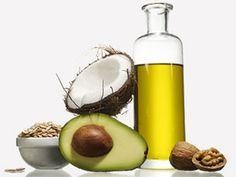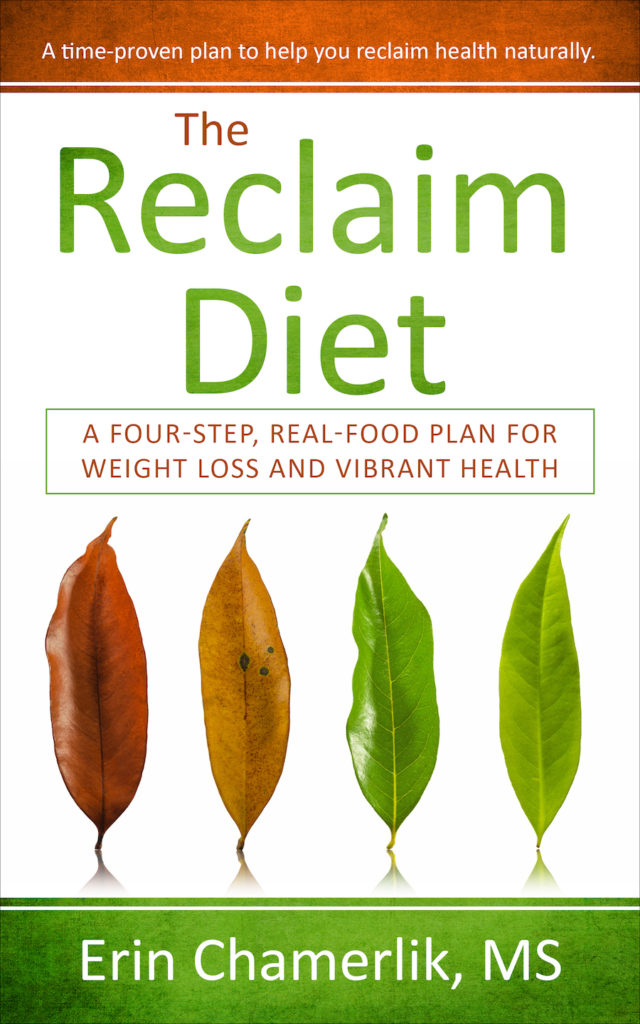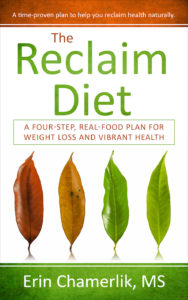
Healthy fat
This information is from my book, The Reclaim Diet.
Healthy fat is not the “baddie” of all nutrients. Contrary to the commonly held belief that fat is bad and makes you sick and overweight, healthy fat is critical for optimal health and is responsible for a huge list of health benefits.
The French Paradox
The French apparently do everything wrong (according to conventional thinking) and yet their incidence of cardiovascular disease and stroke is low. Their diet has always been rich in saturated fat (61). Some wonder if it is the wine that is helping the French stay healthy. Instead of trying to pinpoint one simple explanation for the French Paradox, it is better to consider their diet as a whole along with their lifestyle.
Observations regarding habits of the French: (62)
- Ninety-percent of French adults eat a diverse diet, compared to 33% in the US.
- They drink wine (60% of French women drink one glass or less per day).
- They consume fresh, seasonal foods and 30% of the homes have gardens.
- Eating is a pleasurable, social experience.
The French enjoy better health because of their diet. It is not a paradox.
The French are not afraid of healthy fat, or rich nutrient-dense foods.
They regularly serve red meat, butter, cheese and organ meat at meals.
School lunches in France reflect their values.
The journal, Childhood Obesity, published an article by Jodi Godfrey about the school lunch program in France, “French children willingly eat everything that they are offered, and most of what they are offered is healthy.” Children in the public school system are given freshly prepared three- and four-course hot lunches. School, governments and communities work together to educate families and create systems to feed children well (63).
To learn more about how parents can learn from the French model and raise happy, healthy eaters, pick up a copy of Karen LeBillon’s book, French Kids Eat Everything.
“You’ll sometimes hear about the ‘French paradox’, which describes the phenomenon of low heart disease rates in France ‘despite’ a diet rich in saturated fat. Well, it seems that this ‘paradox’ is not limited to France, but is alive and well in several other countries too, including the U.K., Germany, Austria, Finland, Belgium, Iceland, the Netherlands and Switzerland.
“In other words, it’s not a paradox at all. It’s only a paradox if one believes saturated fat causes heart disease. The thing is, there’s really no good evidence that it does.” — Dr. John Briffa, integrative medicine physician and top graduate of the University College London School of Medicine.
We Must Eat Quality, Healthy Fats
To lose weight and enjoy optimal health, we must eat healthy fats, ideally at every meal and snack. Eating fat does not make you fat. It is not unusual to find people avoiding natural fat, and eating low-fat and fat-free food. This misguided thinking comes from years of hearing that “fat is bad” and causes heart disease, high cholesterol and excess weight gain. For the last 40 years, so-called experts have promoted the notion that butter, meat and eggs must be avoided while we were told to use “heart healthy” oils like canola, soy, sunflower, safflower, corn and peanut oil. These oils actually create inflammation and contribute to heart disease and other chronic health conditions.
Fat Deficiency
Americans are following the anti-fat recommendations, yet heart disease is growing, obesity is skyrocketing, chronic diseases and infertility are rampant.
Do you deal with any of these symptoms of fat deficiency?
- Constantly hungry
- Have cravings for fried food, ice cream and sweets
- Feel fatigued, and often have a mid-afternoon energy drop
- Blood sugar lows or highs
- Unable to lose weight
- Dry skin and dry eyes
- Skin rashes
- Unhealthy looking skin with rough, bumpy and dry areas, wrinkles
- Hormonal imbalances
- Digestive problems (IBS, gas, bloating)
- Gallbladder ailments
- Hypothyroidism, thyroid imbalance
- Dry, brittle hair and nails
- Difficulty with focus and cognition
- Mood swings, depression, anxiety
- Infections (bacterial, fungal, viral)
If you are not consuming healthy fats and use inflammatory, processed oils, you are fat deficient.
Seed oils and vegetable oils like sunflower, safflower, corn oil, soy oil, and canola oil are highly processed. The food industry uses damaging processes in order to extract oil from seeds, corn, peanuts and soy. Often the oils are extracted from genetically modified plants (corn, soy, canola) that have been treated with Roundup® and other harsh chemicals. Extreme heat and chemicals, like hexane, are used to extract the oil. The process leaves a stinky, damaged oil that must be steamed and deodorized before it can be sold.
Processed vegetable and seed oils (even cold-pressed and expeller-pressed) are high in omega-6 fats which increase inflammation in the body and in the arteries. These oils interfere with healthy cellular function, lower your immune system and even impair brain function.
Processed foods (baked goods, crackers, chips, candy bars, frozen meals, fake whipped cream) are loaded with inflammatory oils because they give the product a longer shelf life. Restaurants typically use cheaper oils to save money and rarely use healthy fats and oils to prepare food (french fries, fried chicken, salad dressings, sauces, dips, oils for cooking and baking).
Avoid or limit the following oils and products:
| Corn Oil | Sunflower Oil | Smart Balance | Margarine |
| Canola Oil | Safflower Oil | I Can’t Believe It’s Not Butter | Spreadable Butter with Canola Oil |
| Grapeseed Oil | Peanut Oil | Country Crock, Buttery Spread | Earth Balance |
| Soybean Oil | Cottonseed Oil | Any Vegetable Oil Spread | Light Butter with Canola |
| Vegetable Oil | Palm Kernel Oil | Any “Plant Butter” | Move Over Butter |
Enjoy Eating Healthy Fats Daily
Good fats heal and provide a variety of health benefits shown below. Include healthy natural fat in every meal and snack.
Add about 1 Tbsp of fat per meal, or roughly 10 – 12 grams. Added healthy fat may come from extra-virgin olive oil (EVOO) in salad dressing, or butter added to cooked vegetables. Cook with healthy fats and intentionally add foods like avocado and olives.
Quality matters, as always, especially with fats. Extra-virgin olive oil will ideally list the country of origin and the date the oil was produced. Extra-virgin olive oil is the least processed and will have more health benefits than virgin olive oil or pure olive oil. Animal fats should come from healthy animals raised properly. This plan incorporates plenty of healthy fats, oils and animal foods.
Healthy fat benefits:
- helps with weight loss
- provides a concentrated source of energy without raising blood sugar or insulin
- helps build healthy cell membranes so that cells can take nutrients in and get toxins out efficiently
- supports the hormonal system and fertility
- transports cholesterol to the tissues where it is used in cellular repair and needed to make hormones
- slows the absorption of nutrients so we feel full longer
- helps with the absorption of fat-soluble vitamins: A, E, D, K
- helps us have healthier skin and hair
- supports brain health (sharper brain, clearer thinking)
- supports bone health and helps calcium get into bones
- helps protect your heart and raise the heart-protective HDL cholesterol
- carries micronutrients throughout the body
- supports a healthy digestive system
Examples of Healthy Fats for Cooking
| Low to High Heat Cooking | L |
| Grass-fed Butter, Ghee, organic | |
| Extra-virgin olive oil |
|
| Avocado oil |
|
| Coconut oil |
|
| Macadamia nut oil |
|
| Algae oil |
|
| Red palm oil from the fruit (Nutiva) Avoid palm kernel oil from the seed. |
|
| Duck fat, lard, tallow (only if rendered from wild or pasture-raised animals) |
|
Examples of Foods Containing Healthy Fats:
| Olives, cured (no vinegar) | Grass-fed meat |
| Avocado, guacamole | Wild-caught fatty fish |
| Coconut, coconut milk | Free-range eggs |
| Nuts (about ¼ cup, 1-2 times a day) | Fish oil |
|
| MCT oil |
Coconut Oil is a Superstar
Incorporate unrefined coconut oil into your diet. This is a major player in enhancing energy and weight loss. It is unlike any other oil due to its chemical structure. It is metabolized in the liver and used right away as energy.
You can use it for a stir fry, or for baking vegetables and sweet potato fries. Try cooking eggs in coconut oil or add 1 Tbsp to smoothies or a cup of hot tea.
Unrefined coconut oil benefits: (64)
- raises metabolism and helps with weight loss
- makes you lean because it creates energy and is not stored as fat
- has antibacterial, antifungal, antiviral properties due to the fatty acid, lauric acid, also found in mother’s milk
- lessens the effect of PMS and menopause
- stabilizes the blood sugar and is one of the best oils for diabetics
- acts as a great moisturizer for the skin
- very stable when heated
- easier to digest for those without a gallbladder
Be sure to visit the CoconutResearchCenter.org to read personal testimonies from people using coconut oil and experiencing a multitude of health benefits.
Life-Changing Omega-3 Fatty Acids
I recommend consuming omega-3 fatty acids in the form of food or supplements to avoid a deficiency. They have incredible health benefits documented in the scientific literature: (65, 66, 67)
- reduce inflammation, which may help lower heart disease, cancer and arthritis
- improve insulin sensitivity so that the body needs less insulin to help the cells absorb glucose from the blood
- help regulate the nervous system, blood pressure and blood sugar
- provide beneficial effects for asthma
- reduce joint stiffness and pain
- enhance recovery and optimize training gains in athletes
- reduce the risk of illness
- improve brain function
- fight depression (68)
- improve eye health (69)
- improve cardiovascular health (70)
- provide benefits for skin health (71)
We all want those benefits, right? Just be sure to regularly consume wild-caught fish and pasture-raised animal foods. These sources have beneficial long-chain omega-3 fats, EPA and DHA. Plant foods like flax, hemp and walnuts have short-chain omega-3 fats.
The body is not very efficient at taking the plant-based omega-3s (ALA) and converting them into what it prefers, EPA and DHA. Less than 8% of plant-based omega-3s actually get converted to EPA and less than 1.0% of ALA is converted to DHA (72).
Most of the health benefits provided by omega-3s come from the animal form, the longer chain fats, EPA and DHA. Be sure to eat plenty of wild-caught fish and free-range animal foods. It is a good idea to supplement with a high quality omega-3 supplement that provides about 1,000 mg of DHA.
Health tip to try today: Do you need an “oil change”?
Review the list of unhealthy oils and check your pantry. Replace unhealthy oils with quality fats and incorporate them intentionally into your meals.
References #62-72
- 62. de Lorgeril M, Salen P, Paillard F, Laporte F, Boucher F, de Leiris J. Mediterranean diet and the French paradox: two distinct biogeographic concepts for one consolidated scientific theory on the role of nutrition in coronary heart disease. Cardiovasc Res. 2002 Jun;54(3):503-15. doi: 10.1016/s0008-6363(01)00545-4. Review. PubMed PMID: 12031696.
- 63. Godfrey JR. A tour of school lunch: what we can learn from the French approach. Child Obes. 2012 Oct;8(5):491-5. doi: 10.1089/chi.2012.0085.lunc. PubMed PMID: 23061506.
- 64. Coconut Research Center. http://www.coconutresearchcenter.org/?page_id=5173
- 65. Freitas RDS, Campos MM. Protective Effects of Omega-3 Fatty Acids in Cancer-Related Complications. Nutrients. 2019 Apr 26;11(5). doi: 10.3390/nu11050945. Review. PubMed PMID: 31035457; PubMed Central PMCID: PMC6566772.
- 66. Gammone MA, Riccioni G, Parrinello G, D’Orazio N. Omega-3 Polyunsaturated Fatty Acids: Benefits and Endpoints in Sport. Nutrients. 2018 Dec 27;11(1). doi: 10.3390/nu11010046. Review. PubMed PMID: 30591639; PubMed Central PMCID: PMC6357022.
- 67. Lunn J., Theobald H. The health effects of dietary unsaturated fatty acids. Nutr. Bull. 2006;31:178–224. doi: 10.1111/j.1467-3010.2006.00571.x
- 68. Ginty AT, Conklin SM. Short-term supplementation of acute long-chain omega-3 polyunsaturated fatty acids may alter depression status and decrease symptomology among young adults with depression: A preliminary randomized and placebo controlled trial. Psychiatry Res. 2015 Sep 30;229(1-2):485-9. doi: 10.1016/j.psychres.2015.05.072. Epub 2015 Jun 27. PubMed PMID: 26188642.
- 69. Merle BM, Benlian P, Puche N, Bassols A, Delcourt C, Souied EH. Circulating omega-3 Fatty acids and neovascular age-related macular degeneration. Invest Ophthalmol Vis Sci. 2014 Mar 28;55(3):2010-9. doi: 10.1167/iovs.14-13916. PubMed PMID: 24557349.
- 70. Peter S, Chopra S, Jacob JJ. A fish a day, keeps the cardiologist away! – A review of the effect of omega-3 fatty acids in the cardiovascular system. Indian J Endocrinol Metab. 2013 May;17(3):422-9. doi: 10.4103/2230-8210.111630. PubMed PMID: 23869297; PubMed Central PMCID: PMC3712371.
- 71. McCusker MM, Grant-Kels JM. Healing fats of the skin: the structural and immunologic roles of the omega-6 and omega-3 fatty acids. Clin Dermatol. 2010 Jul-Aug;28(4):440-51. doi: 10.1016/j.clindermatol.2010.03.020. PubMed PMID: 20620762.
- 72. Calder PC. Docosahexaenoic Acid. Ann Nutr Metab. 2016;69 Suppl 1:7-21. doi: 10.1159/000448262. Epub 2016 Nov 15. PubMed PMID: 27842299.
Recommended
-
Dandelion for Liver Support and Health BenefitsJuly 20th, 2024
-
Modified Citrus PectinJuly 11th, 2024
-
Bentonite Clay Mask for Face and ArmpitsJuly 8th, 2024
-
Two Supplements for Erectile DysfunctionJune 30th, 2024









